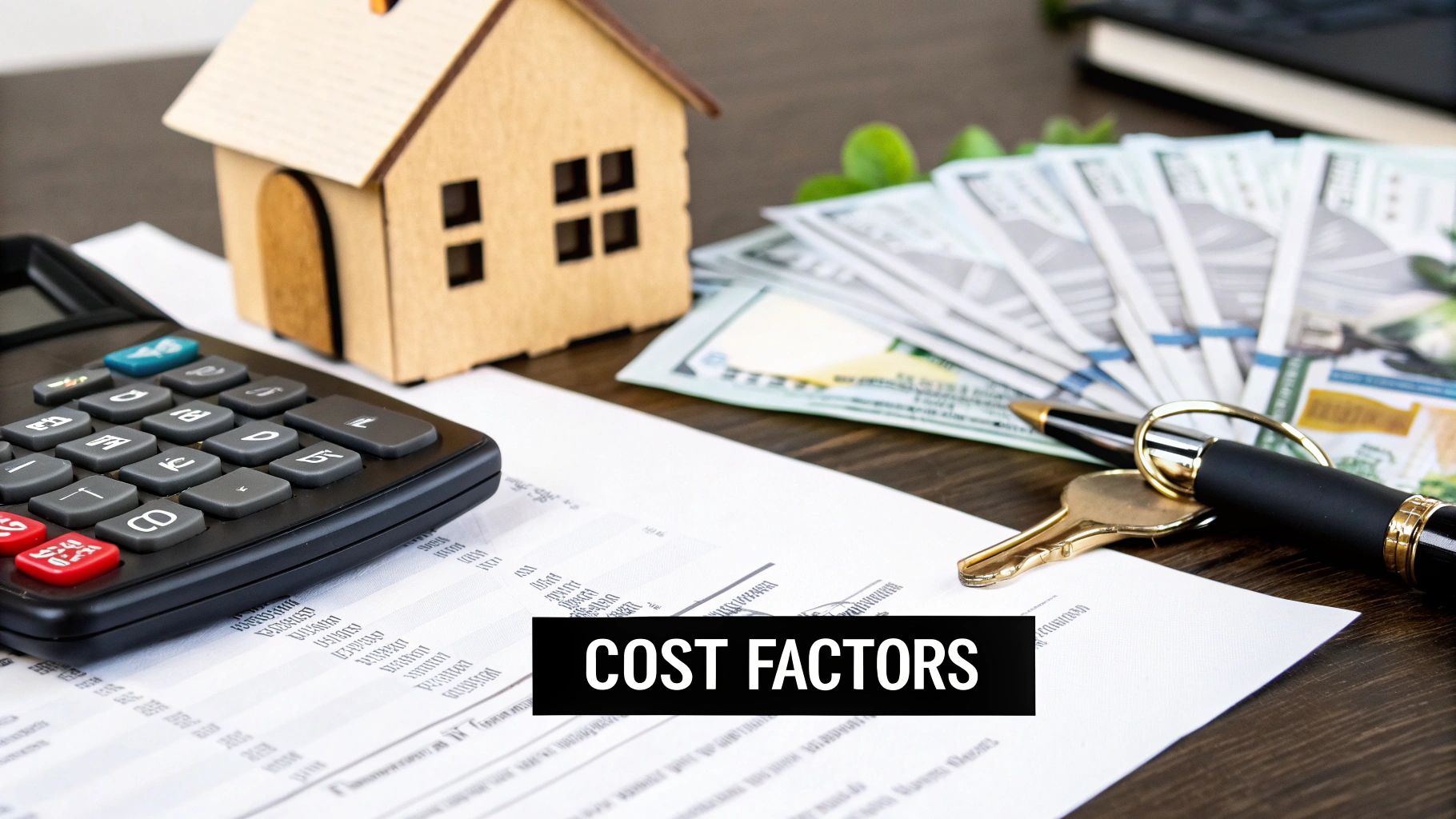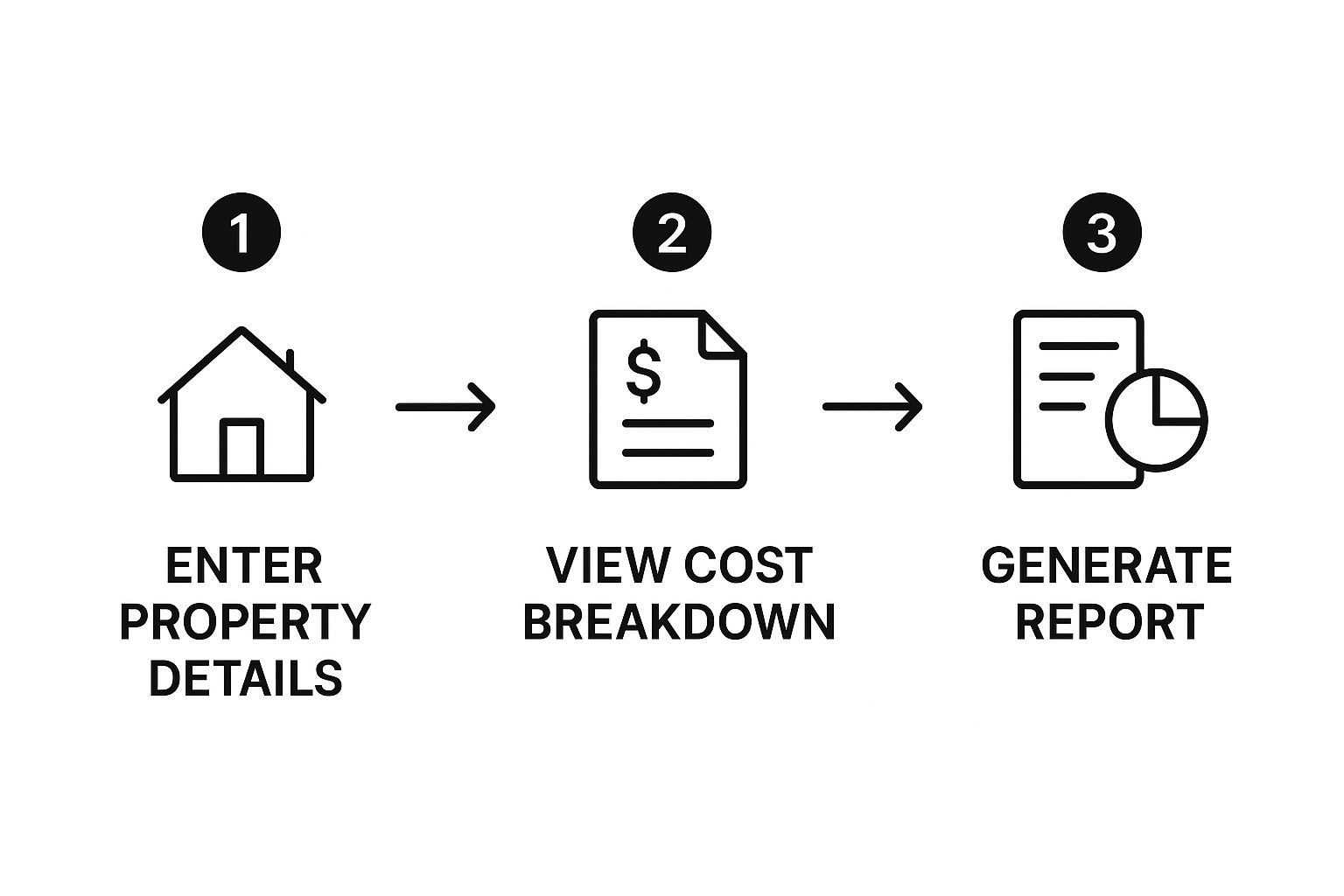Property Management Cost Calculator for Rental Owners
- Sarah Porter

- Sep 9, 2025
- 13 min read
Before you even start punching numbers into a property management cost calculator, it’s essential to get a real feel for what you're actually paying for. These fees aren't just random numbers pulled out of thin air; they represent a whole ecosystem of services designed to protect your investment, give you your time back, and ultimately, boost your rental income.
What Do Real Property Management Fees Actually Include?
When you bring a management company on board, you’re not just hiring someone to collect rent. You're investing in a professional system built to handle the nitty-gritty, day-to-day headaches of being a landlord. That fee, which is usually a percentage of the rent collected, covers a surprisingly broad range of critical tasks.

Think about it—these services are the engine of a healthy rental business. They lead to tangible results like shorter vacancies, airtight legal compliance, and fewer panicked phone calls in the middle of the night. Once you grasp the real value here, you can make a much smarter financial decision.
Core Services Baked Into Your Fee
The monthly management fee is the charge you'll see most often, and it conveniently bundles several key responsibilities into one predictable cost. It's basically your property's all-in-one operating budget.
Here's a quick look at what that fee typically gets you:
Consistent Rent Collection: This is way more than just cashing a check. It means sending out timely reminders, consistently enforcing late fee policies, and providing tenants with a reliable online payment system.
Tenant Communication: Your manager becomes the go-to person for every tenant question, complaint, and maintenance issue. No more constant interruptions for you.
Maintenance Coordination: From a dripping faucet to a dead HVAC unit, they'll field the request, dispatch a vetted professional, and make sure the job gets done right.
Financial Reporting: Forget stuffing receipts in a shoebox. You’ll get clear, regular statements that break down your property’s income and expenses, giving you a complete financial overview.
The real value of a property manager isn't just in the tasks they complete, but in the problems they prevent. Proactive management stops small issues from becoming expensive headaches.
Beyond the Day-to-Day Grind
Good management is about more than just checking boxes on a to-do list. That fee also buys you professional expertise and, frankly, peace of mind.
A huge part of this is navigating the tangled web of landlord-tenant laws, which can be a minefield and change from one city to the next. A solid manager ensures your lease is rock-solid and that you're always in compliance, saving you from potentially devastating legal mistakes.
Getting this right from the beginning is everything. If you're looking for a deeper dive, check out our essential guide to hiring a property manager for a full walkthrough. At the end of the day, when you use a property management cost calculator, you're not just calculating a fee—you're putting a price on expertise, convenience, and the long-term protection of your asset.
What Really Drives Your Management Costs?
Ever wonder why you're quoted an 8% management fee while your friend across town is paying 12%? That final number on a proposal isn't just pulled out of a hat. It’s a carefully calculated figure that hinges on a handful of variables specific to your property and your needs.
Getting a handle on these drivers is the secret to using any property management cost calculator effectively and landing on an estimate that actually makes sense.

First and foremost, the type of property you own is a huge piece of the puzzle. A single-family home in a quiet suburb is just plain easier to manage than a four-plex. More units mean more tenants, more potential issues, shared spaces to maintain, and a higher chance of turnover. The more complex the property, the more work it is for the manager, and that's reflected in the fee.
Location, Location, Location
It’s an old cliché for a reason. Where your rental is located matters just as much as what it is. A property in a bustling downtown might pull in higher rent, but it also faces stiffer competition and often higher maintenance costs, thanks to city regulations and pricier labor.
On the flip side, a rural property might have lower running costs, but the manager might have to put in more legwork to market it and find qualified tenants. The local market dynamics are a major factor here, too. A college town, for example, is a revolving door of tenants, which means a constant cycle of leasing work—a far cry from a stable neighborhood filled with long-term renters.
The Property's Age and Condition
The physical state of your rental is another deal-maker or breaker. A freshly renovated home with shiny new appliances and a brand-new roof is what managers dream of. It’s a safe bet that it will need fewer maintenance calls and will attract great tenants who stick around.
An older property, however, is a different story. If it has creaky plumbing, a decades-old HVAC system, and drafty windows, it’s going to demand a lot more attention. Your property manager has to plan for more repair calls and spend more time coordinating with vendors, which absolutely justifies a higher fee to cover that extra effort.
A property manager’s fee is directly tied to their anticipated workload. The more predictable and low-maintenance your property is, the more negotiating power you have.
The Scope of Services You Actually Need
Finally, what you ask them to do will obviously shape your costs. Are you just looking for someone to collect the rent and handle middle-of-the-night emergencies? Or do you need the whole nine yards: aggressive marketing, rigorous tenant screening, regular inspections, and even dealing with the HOA?
Most companies break their services down like this:
Leasing Only: This is a one-time fee just to find a great tenant and get them moved in.
Full-Service Management: The most common option, this is a monthly fee that covers all the day-to-day operations of your rental.
Custom Packages: Some managers offer à la carte services, letting you add on things like managing bill payments or overseeing a renovation project for an extra cost.
This is all part of a massive business. In the United States alone, the property management market is on track to hit $98.88 billion by 2029. With over 304,000 companies in the game, you have a lot of options. You can explore more on the scale of the property management industry to get a sense of the landscape.
By thinking through each of these factors, you can plug much more accurate info into a property management cost calculator and get a number that truly reflects your situation.
Calculating Your Costs: Percentage vs. Flat-Fee
When you start digging into the numbers with a property management cost calculator, you'll find that nearly every company's pricing boils down to one of two structures. Getting a firm grip on how percentage-based and flat-fee models work is the key to accurately forecasting your expenses and really understanding your bottom line.
The Percentage-Based Model In Action
The most common setup you'll come across is the percentage-based fee. This usually lands somewhere between 8% and 12% of the monthly collected rent. The most important words there are "collected rent." This model puts you and your manager on the same team—if the property is sitting empty, they aren't getting paid their management fee. That gives them a powerful incentive to find and keep quality tenants.
Let's walk through a quick example. Say you own a condo that pulls in $2,500 per month in rent, and your property manager charges a 10% fee.
The math is pretty simple:
Monthly Rent: $2,500
Management Fee: 10%
Your Cost: $2,500 x 0.10 = $250 per month
This model moves in lockstep with your rental income. If you raise the rent, their fee goes up, but that’s because your investment is performing better. It’s a straightforward, shared-risk approach that a lot of owners prefer.
A percentage fee ensures your property manager is motivated to secure the highest possible rent and keep your property occupied. Their income is directly tied to yours.
When a Flat-Fee Model Makes Sense
The other option on the table is the flat-fee model. With this structure, you pay a set amount every month, plain and simple, no matter what the rent is. This fee might be anywhere from $100 to $200 per month, depending on your local market and what services are baked in.
This can be a fantastic deal for owners with higher-end properties. For instance, if your luxury home rents for $5,000 a month, a 10% fee would sting at $500. A flat fee of $200, on the other hand, would mean serious savings. The only catch is making sure the manager stays motivated, since their paycheck isn't directly tied to performance like it is with a percentage model.
The property management industry is booming for a reason. It's projected to become a USD 27.8 billion global market by 2025, with Europe leading the way. This growth is fueled by more owners like you seeking professional help, which has created a competitive space where different pricing models can work. You can get a deeper look into these global trends and explore property management market trends here.
Here's a quick visual of how a calculator helps you process these different fee structures to find the best fit.

This kind of flowchart really shows how a good calculator can cut through the noise, letting you compare your options and make a confident decision.
Comparing The Two Models Side-by-Side
To really see how this plays out in the real world, let's look at how the numbers shake out for a hypothetical property. We'll use a rental that brings in $2,200 per month.
Cost Calculation Example: Percentage vs. Flat Fee
Metric | Percentage Model (10% of Rent) | Flat-Fee Model |
|---|---|---|
Monthly Rental Income | $2,200 | $2,200 |
Fee Structure | 10% of collected rent | $150 fixed monthly fee |
Management Cost | $220/month | $150/month |
Annual Cost | $2,640 | $1,800 |
Winner | Flat-Fee Model |
In this scenario, the flat-fee model clearly comes out ahead, saving the owner $70 a month, or $840 a year. However, if the rent were only $1,400, the 10% percentage model would cost $140, making it the better choice.
This is exactly what a property management calculator is for—it lets you plug in your specific numbers to see which model actually saves you more money. It takes the guesswork out of the equation so you can make the smartest financial choice for your investment.
Uncovering the Hidden Fees You Need to Budget For
That monthly management fee is the number everyone focuses on, but it’s rarely the whole story. If you want a truly accurate picture of your costs, you have to account for the other charges that inevitably pop up. These are pretty standard across the industry, but they can easily catch new landlords off guard.

Knowing about these potential expenses is what separates a predictable, profitable investment from one that slowly drains your ROI with a thousand tiny cuts. Let’s break down the most common charges you’ll need to factor into your numbers.
The Big One: Tenant Placement Fees
Outside of your regular monthly percentage, this is often the largest single charge you'll face. The tenant placement fee, sometimes called a leasing fee, covers the A-to-Z process of getting a new, qualified tenant into your vacant property.
This isn't just sticking a sign in the yard and hoping for the best. A comprehensive placement service typically includes:
Professional Marketing: This means high-quality photos, compelling descriptions, and listing your property across all the major rental websites.
Property Showings: All the back-and-forth of coordinating and conducting tours for prospective renters.
Rigorous Screening: This is crucial. It involves running background checks, pulling credit reports, and verifying employment and past rental history.
Lease Preparation: Drafting and executing a solid, legally sound lease agreement that protects you.
For this full-service process, you can expect to pay a percentage of the first month's rent—the industry standard is anywhere from 50% to 100%. So, on a $2,000 per month rental, you should budget for a one-time hit of $1,000 to $2,000 each time you need a new tenant.
Ongoing and Situational Charges
Once a tenant is in place, other fees can appear on your monthly statement depending on what’s going on with the property. They’re smaller, for sure, but they absolutely add up.
Lease Renewal Fee: When you’ve got a great tenant who wants to stay, some management companies charge a small fee to draft and execute the renewal paperwork. It's usually a flat fee—think $100 to $250—and frankly, it’s a small price to pay to avoid the cost and headache of a vacancy.
Maintenance Markup: When a leaky faucet or a broken appliance needs fixing, your property manager handles it. It’s common practice for them to add a small markup, often around 10%, to the contractor’s invoice. This covers their time for scheduling the job, coordinating with the tenant, and ensuring the work is done right.
A quick tip: Always ask for transparency here. A reputable manager should have no problem providing you with the original vendor invoice so you can see the base cost and their markup. Tracking these details is just good business. Keeping a clean ledger of all expenses is a must, and understanding the basics of bookkeeping for rental properties made simple will make your life a lot easier.
Eviction Service Charge: It’s the last thing any landlord wants to deal with, but evictions are a part of the business. If your manager has to formally evict a tenant, there’s a fee for their time spent filing court documents, appearing in court, and coordinating with law enforcement. This is almost always a flat fee, typically between $300 and $600, not including the actual court costs.
By plugging these potential costs into your budget from the start, you can get a far more realistic picture of your annual expenses and protect your cash flow from those nasty, unexpected hits.
How Technology is Shaping Modern Management Costs
Property management used to be all about spreadsheets, phone calls, and mountains of paperwork. That world is quickly disappearing. Today, technology is at the heart of how efficient companies operate, and this directly influences the fees you'll pay and the service you'll receive.
When you're trying to figure out what you'll spend, it's easy to focus on the percentage fee. But it's just as important to look at the property manager's "tech stack." Are they using modern tools to streamline their work? A company that automates rent collection, maintenance requests, and financial reporting can handle more properties with fewer errors. This efficiency means they can often offer more competitive pricing because their own overhead is lower.
The Real-World Impact of Smart Automation
Think about it this way: instead of a manager manually calling tenants about late rent, a modern system sends automatic reminders. When a faucet starts dripping, a tenant can log into a portal, submit a ticket with a photo, and that request is instantly sent to an approved plumber. It's faster for everyone and creates a perfect digital record of the entire process.
These tech-driven features aren't just bells and whistles; they have a direct, positive impact on your wallet:
Shorter Vacancies: AI-powered tenant screening can vet applicants in a fraction of the time it takes to do it manually, helping you land a qualified tenant faster.
Total Transparency: Owner portals give you 24/7 access to everything—financial statements, inspection notes, and maintenance updates. No more waiting for a month-end report to see how your investment is doing.
Smarter Maintenance: Good software can track the age of your appliances and HVAC system, prompting preventative maintenance checks before something breaks. This foresight helps you avoid those expensive, late-night emergency repair bills.
By letting technology handle the repetitive, day-to-day tasks, a great property manager can focus their energy on what really matters: marketing your property, analyzing market trends to set the right rent, and ultimately, putting more money in your pocket.
This isn't just a fleeting trend. The property management industry is undergoing a massive shift, and technology is the engine. In fact, the global market is projected to hit nearly USD 38.48 billion by 2034, and that growth is largely driven by companies adopting smart platforms. This evolution is making the entire industry more efficient, more transparent, and more focused on the owner's success. You can discover more about the future of property management to see how these changes will continue to shape the services and costs you can expect.
Common Questions About Property Management Costs
Even with a property management cost calculator, a few questions always pop up. Budgeting for this service is more than just plugging in your monthly rent—it's about really understanding what you're paying for and why. Let's tackle some of the most common points of confusion so you can figure out your costs with confidence.
Is a Lower Management Fee Always Better?
It’s really tempting to jump at the lowest percentage you see, but this can be a classic case of "you get what you pay for." A rock-bottom fee might be a red flag that a company is cutting corners on critical services, like thorough tenant screening, or plans to nickel-and-dime you with hidden charges for every little thing.
The goal isn't just to find the cheapest fee; it's to achieve the highest net operating income. A slightly more expensive manager who keeps your property filled, finds reliable tenants, and handles repairs efficiently is almost always a better deal in the long run. You have to look at the total value, not just the base percentage.
A great property manager can be a profit center, not just an expense. The right partner will enhance your property's value and boost your long-term cash flow, easily justifying a competitive fee. This is one of the key advantages of having a professional property manager on your side.
Are Property Management Fees Tax Deductible?
Good news here. Yes, in most situations, property management fees are considered a business operating expense. This means they are fully tax-deductible against your rental income.
This isn't just limited to the monthly management fee. It also includes separate charges for things like tenant placement, lease renewals, or coordinating maintenance. This deduction can seriously reduce the real cost of the service, making it a much more valuable investment than it might seem at first glance. Of course, everyone's tax situation is different, so it's always smart to chat with your tax advisor.
How Can I Negotiate Property Management Fees?
You can absolutely negotiate. It's a common part of the process, especially if you own a larger portfolio. If you're bringing a company several properties to manage, you're in a great position to ask for a lower percentage rate.
If you only have a single property, you might have better luck negotiating specific fees instead of the main percentage. For instance, you could ask to reduce the tenant placement fee or see if they'll waive the lease renewal fee. Your best bet is to do your homework first. If you walk in knowing the average rates in your area, you'll have a much stronger negotiating position.
How Does Calculating Commercial Costs Differ?
While the basic idea is the same, the details for commercial properties are a different ballgame. Commercial property management fees are usually a lower percentage—often in the 4-7% range—but that percentage is applied to a much larger rental income.
Plus, commercial leases are often "triple net" (NNN), meaning the tenants are responsible for taxes, insurance, and maintenance. This completely changes the manager's job. Their duties become more complex and might include things like Common Area Maintenance (CAM) reconciliations, which requires a specialized skillset and directly affects the management cost structure.
Ready to stop guessing and start knowing your real costs? The team at Keshman Property Management provides transparent, all-inclusive pricing designed to maximize your net income without any surprise fees. Let our 20 years of experience work for you. Get your personalized management quote today!

Comments